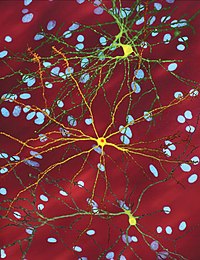
Photo from wikipedia
Pharmacological chaperones (PCs) are small molecules that bind to nascent protein targets to facilitate their biogenesis. The ability of PCs to assist in the folding and subsequent forward trafficking of… Click to show full abstract
Pharmacological chaperones (PCs) are small molecules that bind to nascent protein targets to facilitate their biogenesis. The ability of PCs to assist in the folding and subsequent forward trafficking of disease-causative protein misfolding mutants has opened new avenues for the treatment of conformational diseases such as cystic fibrosis and lysosomal storage disorders. In this chapter, an overview of the use of PCs for the treatment of conformational disorders is provided. Beyond the therapeutic application of PCs for the treatment of these disorders, pharmacological chaperoning of wild-type integral membrane proteins is discussed. Central to this discussion is the notion that the endoplasmic reticulum is a reservoir of viable but inefficiently processed wild-type protein folding intermediates whose biogenesis can be facilitated by PCs to increase functional pools. To date, the potential therapeutic use of PCs to enhance the biogenesis of wild-type proteins has received little attention. Here the rationale for the development of PCs that target WT proteins is discussed. Also considered is the likelihood that some commonly used therapeutic agents may exert unrecognized pharmacological chaperoning activity on wild-type targets in patient populations.
Journal Title: Handbook of experimental pharmacology
Year Published: 2018
Link to full text (if available)
Share on Social Media: Sign Up to like & get
recommendations!